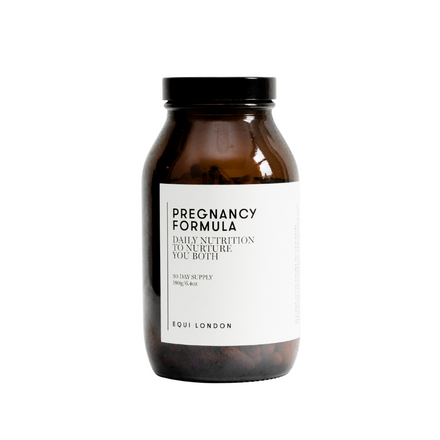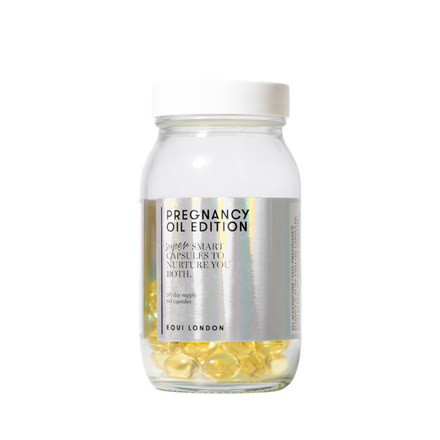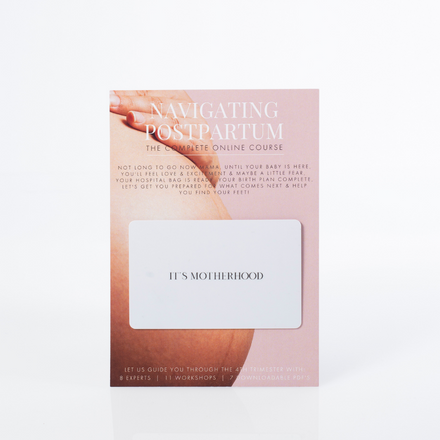How nutritional supplements can support your fertility & pregnancy journey
Whether you are currently trying to conceive, pregnant or are now breast-feeding, there is never a better time to start optimising your health through nutrition. Here at Equi, we advocate a varied and nutritious diet alongside our comprehensive formulas to support optimal health and wellbeing.
Our Pregnancy Formula is a super high quality and carefully formulated quality supplement that provides twenty-six of the finest ingredients to support your fertility journey - from your pre-conception plan right through to breastfeeding.
Equi’s expert nutritionists who specialise with women’s wellbeing have provided us with information about some of the key nutrients in their award winning formula, and how they can promote a healthy conception, pregnancy, and postpartum journey.
“Ideally, start supplementing your diet around three months ahead of conception. This timeframe factors in the maturation of oocytes (eggs), as well as a consideration for any nutrient deficiencies that might need supporting (1). Often, women have been on the oral contraceptive pill (OCP) for a long period of time and without realising, this may have depleted some of the key nutrients essential for pregnancy”.

Pregnancy and Folate Vs Folic Acid
Many women understand the importance of supplementing folic acid during pregnancy due to its involvement in prevention of neural birth defects. However, few are aware that about 40-60% of the population (2) are not able to make the conversion of the synthetic form (folic acid) to the active form, known as folate. This is why it’s important to point out the use of the active form ‘5-methyltetrahydrofolate’ in the Pregnancy Formula. As well as protecting baby during development, this form of folate alongside B12 supplementation has been shown (3) to protect against anaemia in pregnancy. Alongside supplementation additional folate can be obtained from the diet through dark green leafy veg such as broccoli, kale, pak choy, Brussel sprouts, spring greens as well as lentils, chickpeas and beans.
Best B Vitamins for Pregnancy
I’ve already touched on two of the key B vitamins for pregnancy (folate, B9 and B12), but the rest of the B vitamins are also important when it comes to fertility. Why? Several studies have highlighted that taking the OCP may result in depletion of the B vitamins including B1, B2, B3 (4) and B6 (5). Optimising the B’s during your pre-conception period are pretty important for a healthy pregnancy. Whilst during pregnancy, maintaining optimal levels through supplementation will also support energy levels as they are involved in energy production in every single body cell. If you do start to feel nauseous and therefore, unable to eat a varied diet in the early pregnancy stages, supplementation can keep your levels on track in the meantime!
Pregnancy and Choline
Studies support the supplementation of choline (6) (sometimes categorised as a B vitamin) in pregnancy as it plays a vital role in brain and tissue development. In particular, it’s an important nutrient to supplement early on in pregnancy (ideally ahead of conception) since the foundation of brain development is established in the first 2 years of life from conception (7). Whilst we can obtain choline from food sources such as eggs, fish and red meat, but we likely won’t get enough of this without supplementing. This is why we add VitaCholine™️, an optimal form of this essential nutrient to our Pregnancy Formula.
Pregnancy and Vitamin D
We know that Vitamin D is super important for supporting a healthy immune system and for fertility (8), yet many of us are not hitting the optimal levels. This is because we rely on UVB sun rays making contact with the skin to produce vitamin D. Not only that but darker skin requires stronger rays too, which is sadly not something we experience often in the UK! Whilst the guidelines in the UK are to supplement 400IU per day during the winter months, a recent study (r9) concluded that actually more like 1000IU per day during preconception or pregnancy is needed to achieve optimal concentrations. Since this level is included in the Pregnancy Formula, there is no need to add in additional supplementation of vitamin D, which is super helpful.
Nutrients to Support Thyroid Function
The thyroid is a hormone producing gland that has a butterfly shaped appearance, located in front of the windpipe. The thyroid hormones regulate metabolism, growth and development and numerous studies suggest that optimal thyroid function (10) is crucial when it comes to a healthy pregnancy. Key nutrients that support the production of the thyroid hormones during pregnancy include Selenium (11) Iodine (12) and Zinc (13). For many reasons (including soil depletion of minerals), it can prove a challenge to get in these key nutrients through food so it’s a good idea to ensure they are part of your supplement formula. However, food sources to include in your diet are brazil nuts (around x3 per day max is enough to deliver enough selenium), fish, seafood, pumpkin seeds, wholegrains and meat.
Antioxidants and Pregnancy
Vitamins A, C and E have a protective role to play in the body as antioxidants, defending against tissue damage from ‘free radicals’. You can ensure to optimise your intake of these key nutrients by ‘eating the rainbow’. Vitamin A, in one of its food-forms is known as beta-carotene and is rich in lots of orange foods such as carrots, squash, sweet potato and mangoes as well as some greens such as spinach and broccoli. You can also find some of the active form of vitamin A in egg yolk, beef and bone broth. Vitamin C is not only found in citrus fruits but also kiwi, tomatoes, peppers and greens again including kale and watercress. What’s great about this vitamin is that it not only important for maintaining a healthy pregnancy but enhances iron absorption (with iron being essential for pregnancy too), and it also plays an important role in rejuvenating ‘used’ Vitamin E. Nuts, seeds and avocado are good sources of vitamin E. So, by making sure you are focusing on a varied and whole foods diet, you will ensure you are ticking these antioxidants off of your pregnancy nutrition list.
Pregnancy and Omega 3
Whilst these can be obtained in the diet as mentioned, the richest source of omega 3 is oily fish yet it is advised in pregnancy to consume no more than 1 portion per week (due to heavy metal toxicity). Therefore, it’s a good idea to supplement a good quality omega 3 in the form of a fish oil during pregnancy. A recent update of a Cochrane review (14) supported the supplementation of omega 3 (particularly DHA and EPA) during pregnancy. We created our Pregnancy Oil Edition as the perfect partner to Pregnancy Formula, which is high in super pure, triglyceride form DHA omega 3 to support healthy foetal brain development. This is also supportive during breastfeeding.
Disclaimer: Certain supplements are used for different reasons and a one-size-fits-all approach shouldn’t be adopted. In addition, pregnant women and anyone on medication should always consult a doctor before embarking on a supplements programme. As with all articles from www.equilondon.com, this is no substitution for individual medical or nutritional advice.
References
-
Schaefer, E. and Nock, D., 2019. The Impact of Preconceptional Multiple-Micronutrient Supplementation on Female Fertility. Clinical Medicine Insights: Women's Health, 12, pp.1179562X1984386
-
JA, G. and SJ, B., 2021. Multivitamin Supplementation During Pregnancy: Emphasis on Folic Acid and l-Methylfolate. [online] PubMed. Available at: <https://pubmed.ncbi.nlm.nih.gov/22229066/> [Accessed 6 April 2021].
-
Bentley, S., Hermes, A., Phillips, D., Daoud, Y. and Hanna, S., 2011. Comparative Effectiveness of a Prenatal Medical Food to Prenatal Vitamins on Hemoglobin Levels and Adverse Outcomes: A Retrospective Analysis. Clinical Therapeutics, 33(2), pp.204-210.
-
Park, B. and Kim, J., 2016. Oral Contraceptive Use, Micronutrient Deficiency, and Obesity among Premenopausal Females in Korea: The Necessity of Dietary Supplements and Food Intake Improvement. PLOS ONE, 11(6), p.e0158177.
-
Wilson, S., Bivins, B., Russell, K. and Bailey, L., 2011. Oral contraceptive use: impact on folate, vitamin B6, and vitamin B12 status. Nutrition Reviews, 69(10), pp.572-583.
-
Korsmo, H., Jiang, X. and Caudill, M., 2019. Choline: Exploring the Growing Science on Its Benefits for Moms and Babies. Nutrients, 11(8), p.1823.
-
Derbyshire, E. and Obeid, R., 2020. Choline, Neurological Development and Brain Function: A Systematic Review Focusing on the First 1000 Days. Nutrients, 12(6), p.1731.
-
Fung, J., Hartman, T., Schleicher, R. and Goldman, M., 2017. Association of vitamin D intake and serum levels with fertility: results from the Lifestyle and Fertility Study. Fertility and Sterility, 108(2), pp.302-311.
-
Pilz, S., Zittermann, A., Obeid, R., Hahn, A., Pludowski, P., Trummer, C., Lerchbaum, E., Pérez-López, F., Karras, S. and März, W., 2018. The Role of Vitamin D in Fertility and during Pregnancy and Lactation: A Review of Clinical Data. International Journal of Environmental Research and Public Health, 15(10), p.2241.
-
Li, J., Liu, A., Liu, H., Li, C., Wang, W., Han, C., Wang, X., Zhang, Y., Teng, W. and Shan, Z., 2019. Maternal TSH levels at first trimester and subsequent spontaneous miscarriage: a nested case–control study. Endocrine Connections, 8(9), pp.1288-1293.
-
Duntas, L., 2020. Selenium and at-risk pregnancy: challenges and controversies. Thyroid Research, 13(1).
-
Lee, S. and Pearce, E., 2015. Iodine intake in pregnancy—even a little excess is too much. Nature Reviews Endocrinology, 11(5), pp.260-261.
-
Ota, E., Mori, R., Middleton, P., Tobe-Gai, R., Mahomed, K., Miyazaki, C. and Bhutta, Z., 2015. Zinc supplementation for improving pregnancy and infant outcome. Cochrane Database of Systematic Reviews,.
-
Middleton, P., Gomersall, J., Gould, J., Shepherd, E., Olsen, S. and Makrides, M., 2019. Omega-3 Fatty Acid Addition During Pregnancy. Obstetrical & Gynecological Survey, 74(4), pp.189-191.







